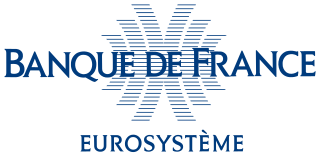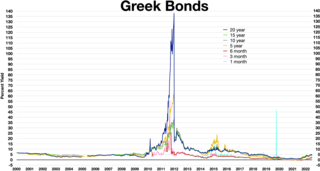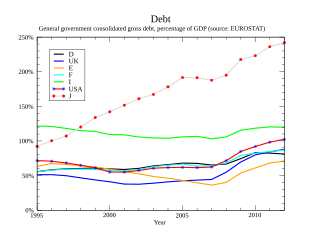Related Research Articles

Piraeus Bank is a Greek multinational financial services company with its headquarters in Athens, Greece. Piraeus Bank's shares have been listed on the Athens Stock Exchange (ATHEX) since January 1918.

The Bank of France, headquartered in Paris, is the central bank of France. Founded in 1800, it began as a private institution for managing state debts and issuing notes. It is responsible for the accounts of the French government, managing the accounts and the facilitation of payments for the Treasury and some public companies. On 1 January 1999, France adopted the euro and the Bank of France became a founder member of the Eurosystem. Until then, it has been responsible for the former national currency, the French franc.
A bailout is the provision of financial help to a corporation or country which otherwise would be on the brink of bankruptcy.

Lucas Demetrios Papademos is a Greek economist and academic who served as 12th Prime Minister of Greece from November 2011 to May 2012, leading a national unity government in the wake of the Greek debt crisis. A technocrat, he previously served as Vice-President of the European Central Bank from 2002 to 2010 and Governor of the Bank of Greece from 1994 to 2002.

Charles Albert Eric Goodhart, is a British economist. His career can be divided into two sections: his term with the Bank of England and its associated public policy; and his academic work with the London School of Economics. Charles Goodhart's work focuses on central bank governance practices and monetary frameworks. He also conducted academic research into foreign exchange markets. He is best known as the founder of Goodhart's Law, which states: "When a measure becomes a target, it ceases to be a good measure."
Attica Bank S.A., formerly the Bank of Attica SA, is engaged in the Greek banking sector. It is the fifth largest Greek bank. Its headquarters are in Athens and its 48 branches are spread nationwide.

Mathias François Dewatripont is a Belgian economist and professor at the Université libre de Bruxelles (ULB) and visiting professor at the Massachusetts Institute of Technology (MIT).

The European debt crisis, often also referred to as the eurozone crisis or the European sovereign debt crisis, is a multi-year debt crisis that took place in the European Union (EU) from 2009 until the mid to late 2010s. Several eurozone member states were unable to repay or refinance their government debt or to bail out over-indebted banks under their national supervision without the assistance of third parties like other eurozone countries, the European Central Bank (ECB), or the International Monetary Fund (IMF).

Greece faced a sovereign debt crisis in the aftermath of the financial crisis of 2007–2008. Widely known in the country as The Crisis, it reached the populace as a series of sudden reforms and austerity measures that led to impoverishment and loss of income and property, as well as a small-scale humanitarian crisis. In all, the Greek economy suffered the longest recession of any advanced mixed economy to date. As a result, the Greek political system has been upended, social exclusion increased, and hundreds of thousands of well-educated Greeks have left the country.

Debt crisis is a situation in which a government loses the ability of paying back its governmental debt. When the expenditures of a government are more than its tax revenues for a prolonged period, the government may enter into a debt crisis. Various forms of governments finance their expenditures primarily by raising money through taxation. When tax revenues are insufficient, the government can make up the difference by issuing debt.

George S. Tavlas is an economist. He has been the Alternate to the Governor of the Bank of Greece for the European Central Bank since 2008. Tavlas was Director General of the Bank of Greece from 2010-2013, and a member of the General Council and the Monetary Policy Council of the Bank of Greece from 2013 to 2020. He was involved in the management and resolution of the Greek government-debt crisis. Tavlas is Editor-in-Chief of Open Economies Review. He is also a Distinguished Visiting Fellow at the Hoover Institution at Stanford University.
The Liikanen Report or "Report of the European Commission’s High-level Expert Group on Bank Structural Reform" is a set of recommendations published in October 2012 by a group of experts led by Erkki Liikanen, governor of the Bank of Finland and ECB council member. On 3 July 2013, by large majority the European Parliament adopted an own initiative report called "Reforming the structure of the EU banking sector" that welcomes structural reform measures at Union level to tackle concerns on Too big to fail banks, that led to the publication of a proposal of Regulation on structural measures improving the resilience of EU credit institutions in January 2014. This proposal was withdrawn in July 2018.

The proposed long-term solutions for the Eurozone crisis involve ways to deal with the ongoing Eurozone crisis and the risks to Eurozone country governments and the Euro. They try and deal with the difficulty that some countries in the euro area have experienced trying to repay or re-finance their government debt without the assistance of third parties. The solutions range from tighter fiscal union, the issuing of Eurozone bonds to debt write-offs, each of which has both financial and political implications, meaning no solution has found favour with all parties involved.
A contingent convertible bond (CoCo), also known as an enhanced capital note (ECN) is a fixed-income instrument that is convertible into equity if a pre-specified trigger event occurs. The concept of CoCo has been particularly discussed in the context of crisis management in the banking industry. It has been also emerging as an alternative way for keeping solvency in the insurance industry.
The Second Economic Adjustment Programme for Greece, usually referred to as the second bailout package or the second memorandum, is a memorandum of understanding on financial assistance to the Hellenic Republic in order to cope with the Greek government-debt crisis.
The Hellenic Financial Stability Fund, or HFSF is a Greek special purpose vehicle created to help stabilize the Greek banking sector amidst the Greek government-debt crisis.

Cardano is a public blockchain platform. It is open-source and decentralized, with consensus achieved using proof of stake. It can facilitate peer-to-peer transactions with its internal cryptocurrency, ADA.
Miranda Xafa is a Greek economist, formerly Greece's representative at the IMF Executive Board and chief economic adviser to the Prime Minister of Greece, and currently CEO of an Athens-based advisory firm. She is also a senior fellow at the Centre for International Governance Innovation.
Aggelos Kiayias FRSE is a Greek cryptographer and computer scientist, currently a professor at the University of Edinburgh and the Chief Science Officer at Input Output Global, the company behind Cardano.
In 2009–2010, due to substantial public and private sector debt, and "the intimate sovereign-bank linkages" the eurozone crisis impacted periphery countries. This resulted in significant financial sector instability in Europe; banks' solvency risks grew, which had direct implications for their funding liquidity. The European central bank (ECB), as the monetary union's central bank, responded to the sovereign debt crisis with a series of conventional and unconventional measures, including a decrease in the key policy interest rate, and three-year long-term refinancing operation (LTRO) liquidity injections in December 2011 and February 2012, and the announcement of the outright monetary transactions (OMT) program in the summer of 2012. The ECB acted as a de facto lender-of-last-resort (LOLR) to the euro area banking system, providing banks with cash flow in exchange for collateral, as well as a buyer of last resort (BOLR), purchasing eurozone sovereign bonds. However, the ECB's policies have been criticised for their economic repercussions as well as its political agenda.
References
- ↑ "Professor Emilios Avgouleas | Edinburgh Law School". www.law.ed.ac.uk. Retrieved 2023-03-09.
- ↑ Emilios Avgouleas's research while affiliated with the University of Edinburgh and other places, ResearchGate. https://www.researchgate.net/scientific-contributions/81014223_Emilios_Avgouleas Retrieved April 28, 2020
- ↑ "Members". European Banking Authority. 2013-06-03. Retrieved 2023-03-09.
- ↑ "Input Output". IOHK. Retrieved 2023-03-09.
- ↑ "School of Law Staff (The University of Manchester)". 2011-08-20. Archived from the original on 2011-08-20. Retrieved 2023-03-09.
{{cite web}}: CS1 maint: bot: original URL status unknown (link) - ↑ "People | Edinburgh Law School". www.law.ed.ac.uk. Retrieved 2023-03-09.
- ↑ "Blockchain Technology Laboratory". The University of Edinburgh. Retrieved 2023-03-09.
- ↑ “MiFID II: Getting it right for the City and EU financial services industry”, Lords select committee, UK Parliament. https://publications.parliament.uk/pa/ld201213/ldselect/ldeucom/28/2804.htm
- ↑ "Members". European Banking Authority. 2013-06-03. Retrieved 2023-03-09.
- ↑ Avgouleas, E (May 3, 2018)“Securities and (derivatives?) trading and clearing in the era of blockchain: a glass half full!” Asian Institute of International Financial Law, Faculty of Law, University of Hong Kong. https://www.law.hku.hk/aiifl/securities-and-derivatives-trading-and-clearing-in-the-era-of-blockchain-a-glass-half-full-thur-3-may-1230-130-pm/
- ↑ IOHK Team. Retrieved April 23, 2020 from https://iohk.io/en/team/emilios-avgouleas
- ↑ "Could the world be heading for another financial crisis?". www.aljazeera.com. Retrieved 2023-03-09.
- ↑ Legorano, Patricia Kowsmann, Margot Patrick and Giovanni. "The Bank Backstop: Can Europe's Lenders Weather the Coronavirus Crisis?". WSJ. Retrieved 2023-03-09.
- ↑ Avgouleas, E, (May 23, 2014) “Ethics in the banking sector: restoring lost confidence”, delivered at “The Future of the European Banking Union” conference, Hellenic Bank Association. https://www.hba.gr/Events/UplFiles/ekdiloseis%20triton%20foreon/ERA_214D68_E_new.pdf
- ↑ Goodhart, Charles; Avgouleas, Emilios (2014-08-11). "A Critical Evaluation of Bail-Ins as Bank Recapitalisation Mechanisms". Rochester, NY. SSRN 2478647.
{{cite journal}}: Cite journal requires|journal=(help) - ↑ Avgouleas, E (November 25, 2015) “A Greek bank tragedy”, Greek Public Policy Forum. http://www.greekcrisis.net/2015/11/a-greek-bank-tragedy.html
- ↑ "The $400 billion ripoff that could destroy the Greek bailout". CNBC. Retrieved 2023-03-09.
- ↑ Formation of selection panel announcement, Hellenic Financial Stability Fund. January 19, 2016. http://www.hfsf.gr/files/announcement_20160119_en.pdf
- ↑ Annual Financial Report, Hellenic Financial Stability Fund, July 2016. http://www.hfsf.gr/files/hfsf_annual_report_2015_en.pdf
- ↑ Interim Financial Report, Hellenic Financial Stability Fund, December 2016. http://www.hfsf.gr/files/HFSF_Interim_January_June_2016_en.pdf
- ↑ Goodhart, Emilios Avgouleas, Charles (2016-12-05). "An Anatomy of Bank Bail-ins – Why the Eurozone Needs a Fiscal Backstop for the Banking Sector". European Economy. Retrieved 2023-03-09.
- ↑ Eichengreen, B, Avgouleas, E, et al (March 2018) “Independent report on the Greek official debt”, CEPR Policy Insight No 92. https://cepr.org/sites/default/files/policy_insights/PolicyInsight92.pdf
- ↑ "Putting the Greek debt problem to rest". CEPR. Retrieved 2023-03-09.
- ↑ "Greek central bank aims to use lenders' tax credits to fix bad debts". Financial Times. 2018-11-21. Retrieved 2023-03-09.
- ↑ Hope, K (May 20, 2019) “Greek banks play long game on road to recovery”, Financial Times. https
- ↑ Weihua, C (November 11, 2019) “Cooperation between China and Greece extends across subjects”, China Daily, global edition, p3.
- ↑ "Time to implement a tech-driven sovereign debt transparency initiative: Concept, design, and policy actions".